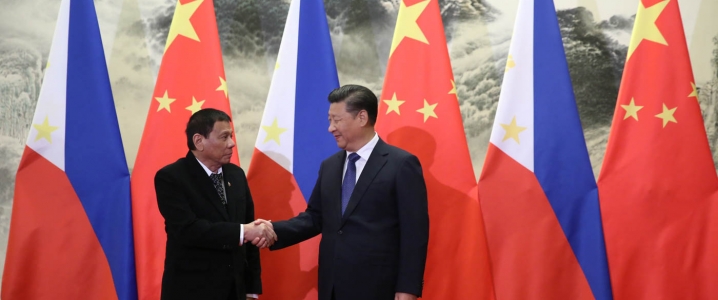In a controversial move in this Southeast Asian country of nearly 100 million people, Philippine President Rodrigo Duterte and visiting Chinese President Xi Jinping lead officials from both sides yesterday in signing a MoU for joint oil and gas development in the hotly contested South China Sea.
The non-binding MoU was one of at least 29 signed between the Philippines and China during Xi’s two-day state visit to the Philippines which concluded on Wednesday. However, most of the media attention in the Philippines has been on the oil and gas deal.
Details remain sketchy at this point, but according to media reports in Manila, citing statements made by Philippine senators, the joint oil and gas development deal would not affect sovereign rights and claims of the two countries over disputed waters.
The MoU creates a body that will study how the two countries can pursue joint exploration and development, while a government source privy to the MOU told Manila-based news outlet Rappler that the agreement doesn’t mean the immediate engagement of joint exploration or joint development of marine resources. But it does pave the way for the crafting of a program on how such joint ventures can happen in the future.
The Philippines as well as several other Association of Southeast Asian Nations (ASEAN) members have overlapping claims with Beijing in the South China Sea. However, the Philippines has had the harshest treatment from its giant neighbor to the north. In 2012, after weeks of a terse standoff between Philippine and Chinese naval and maritime vessels, the Philippines finally withdrew and lost control of Scarborough Shoal, even though the area lies within the Philippines’ UN-mandated 200 nautical mile exclusive economic zone (EEZ), an agreement that Beijing signed off on in 1992, and now mostly violates.
Related: UAE: OPEC Very Likely To Agree To Oil Production Cuts
China, for its part, does not recognize the Philippines’ rights over Scarborough Shoal or the Spratly Islands, also in the South China Sea. Beijing also claims around 90 percent ownership of the entire South China Sea, based on so-called, but undocumented, historical ownership. However, other South China Sea claimants, can also make the same case, especially Vietnam, which in 2016 actually provided centuries old maps and documents to support its case
However, past disputes between China and the Philippines have been pushed aside, as Duterte seeks more economic and perhaps in time military partnership with Beijing, while often criticizing long-time ally, the U.S.
Based on the two-page draft China version of the recently signed MoU, the proposed joint exploration for oil and gas would be in accordance with the principles of “mutual respect, fairness and mutual benefit, flexibility and pragmatism and consensus through equal and friendly consultations.”
“The joint oil and gas exploration should not affect the respective position on sovereignty and maritime rights and interests of the two parties,” Section V on “Relevant Position” of the draft read. “Without prejudice to their respective positions, the two parties should, based on the outcome of the joint exploration, make arrangements for the relevant bilateral cooperation including joint exploration,” the draft also read.
Related: The Oil Industry Is Facing A "Capex Conundrum"
Oil and gas deal going forward
However, going forward there will still be push back against the recent oil and gas deal, particularly in the Philippines, where political protest is common, while throngs of Filipinos often make their voices heard in street protests. The problem this time around is that free expression is frowned upon by the Duterte administration, which is already being accused of excessive force in battling several problems in the country, including police brutality and the killing of thousands in the government crackdown on illegal drug activity.
Another problem for the fledgling bond between China and the Philippines is that it simply will not last. Politics in the Philippines, if nothing else, is fickle and changes quickly. Thought Duterte has just under four more years in his one-time six-year presidential term, a round of new presidential contenders will likely use his China pivot as a campaign platform to pull back from Beijing, including the recently signed joint oil and gas development MoU.
By Tim Daiss for Oilprice.com
More Top Reads From Oilprice.com:
- Economic Turmoil Could Send Oil Even Lower
- Is There Any Hope Left For Oil Bulls?
- Rig Count Falls Amid Recovering Oil Prices


















What lies behind the intensified territorial disputes over islands in the South China Sea is the belief that there are huge oil and gas resources in their waters. Without the hydrocarbon resources, the disputes would have subsided long time ago or remained at best mere disputes on paper since virtually all of these islands and reefs are uninhabited though some of them lie close to international maritime lanes in the South China Sea.
However, the signing of a MoU between China and the Philippines for joint oil and gas development could act as a model for other countries in dispute with China in the South China Sea. It means that such agreement will not prejudice the respective position on sovereignty and maritime rights and interests of the two parties or the rights of other countries signing similar agreements with China in the future but still allows them to jointly benefit from any discovered oil and gas reserves.
That would be a step in the right direction towards mitigating any escalation of conflicts in the future.
Dr Mamdouh G Salameh
International Oil Economist
Visiting Professor of Energy Economics at ESCP Europe Business School, London